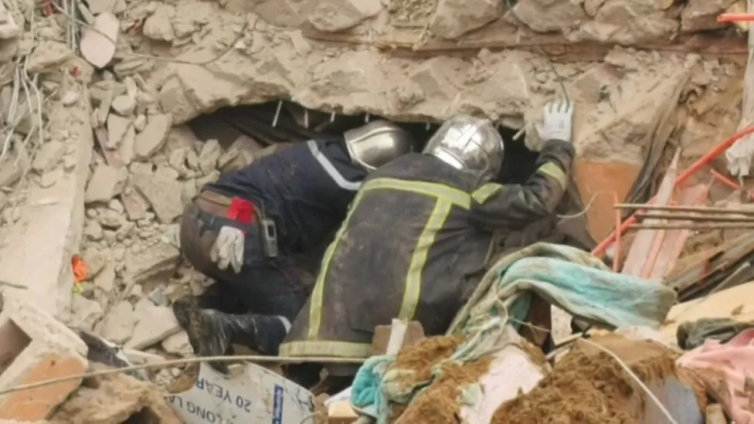Thirty-three people are now known to have died in Cameroon's biggest city, Douala, after a four-storey building collapsed and fell onto another residential block.
It happened early on Sunday morning in the city's Ange Raphaël neighbourhood and the cause is still not clear.
At least 21 people have been injured, many of whom are receiving treatment at the nearby Laquintinie Hospital.
A three-year-old girl who was taken to hospital on Sunday later died.
Distressed neighbours have been searching the rubble for survivors along with emergency services.
The regional governor, Samuel Dieudonné Ivaha Diboua, has sought to reassure people - saying the situation is under control and rescue teams will make sure nobody is left beneath the wreckage.
A top official tells the BBC he is bitterly disappointed that lives have been lost despite strides made in recent years to improve safety.

"We'd been happy not to have had any such disasters for a while now - especially in Douala where the mayor is really trying to bring order," says Kizito Ngoa, the head of Cameroon's Order of Civil Engineers which regulates housing in the country.
Since Douala's last big building collapse in 2016, the city council has been knocking down homes deemed at risk from flooding or landslides, but the four-storey block that collapsed on Sunday was not earmarked for demolition.
Residents told journalists that it looked dilapidated but local officials have not confirmed what caused the accident.
In a statement on Sunday they reminded anyone wanting to build homes in Douala that they must first get an official permit and then "stick rigorously to the approved design".
Mr Ngoa tells the BBC that the failure to follow planning rules is one of the biggest causes of building collapses across the country, and says the true cost of a construction project should be made clear to the public.
"There is a widespread feeling that everyone can just do what they want" and "there is obviously this desire to save money at all stages of a project".
Sometimes council workers are complicit in this, he says, and when sanctions and inquiries do happen they are not publicised enough.
Latest Stories
-
Akufo-Addo leads nationwide commissioning of 80 educational projects
3 mins -
Ghana and Seychelles strengthen bilateral ties with focus on key sectors
34 mins -
National Elections Security Taskforce meets political party heads ahead of December elections
37 mins -
Samsung’s AI-powered innovations honored by Consumer Technology Association
57 mins -
Fugitive Zambian MP arrested in Zimbabwe – minister
1 hour -
Town council in Canada at standstill over refusal to take King’s oath
1 hour -
Trump picks Pam Bondi as attorney general after Matt Gaetz withdraws
2 hours -
Providing quality seeds to farmers is first step towards achieving food security in Ghana
2 hours -
Thousands of PayPal customers report brief outage
2 hours -
Gary Gensler to leave role as SEC chairman
2 hours -
Contraceptive pills recalled in South Africa after mix-up
2 hours -
Patient sues Algerian author over claims he used her in novel
2 hours -
Kenya’s president cancels major deals with Adani Group
3 hours -
COP29: Africa urged to invest in youth to lead fight against climate change
3 hours -
How Kenya’s evangelical president has fallen out with churches
3 hours

